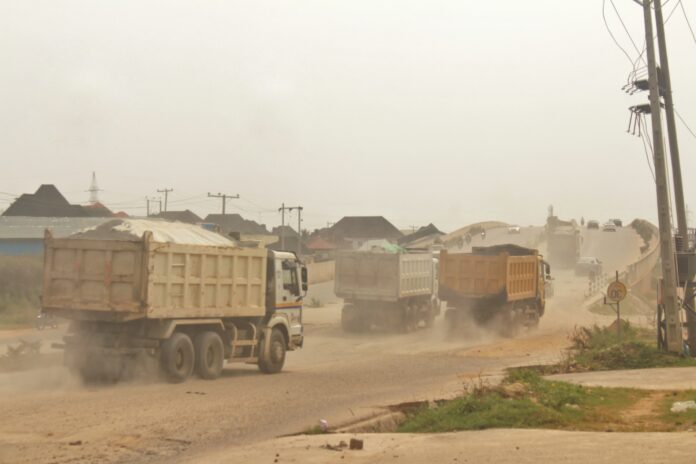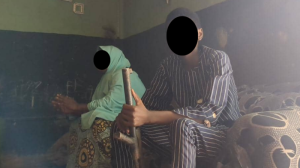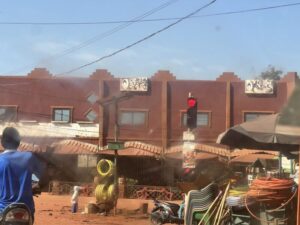Three foreign-owned quarries are exposing Abuja rural communities to an ecological time bomb. Their mining activities pollute the environment and threaten the survival of their host communities, despite generating billions in revenue annually.
In this report, ADEDOKUN THEOPHILUS narrates the story of the endangered communities threatened by profit-seeking mining companies owned by the Chinese and Turkish businessmen.
It is close to midday on a Tuesday in May and the skies of Kubwa community are already filled with heavy dust and dirt billowing from the operation site of Zeberced Limited Company.
Angry but helpless residents of the community go about their businesses as they inhale the polluted air coming from the quarry site and smoke from heavy trucks.
Mining activities by major companies such as Zeberced Limited Company, Istanbul Concrete Limited and Venus Mining Company continue to threaten the environment in Abuja, the Federal Capital Territory and put many residents in clear danger, yet the regulatory agencies fail to act.
Among the long-suffering residents of the environmentally polluted community is Blessing Lawrence, a petty trader who narrated how she relocated to Niger State, a neighbouring state, during her pregnancy to prevent potential miscarriage.
“Sometimes, I felt my baby was not kicking and I regularly fell sick.”
So, she relocated to Niger state. When Blessing returned after birth, she moved a few kilometres away from the quarry site with the expectation that her troubles would significantly reduce.
That did not happen.
The persistent buzzes of heavy machinery, trucks and continuous blasting make her little daughter restless and sleepless. Some studies have linked pregnancy complications such as miscarriage, premature birth and low birth weight to air pollution. However, other non-mining related factors can increase the risk of these complications.
Like Kubwa, Bmuko community is facing its own ordeals at the hands of Turkish and Chinese firms, Istanbul Concrete Limited and Venus Mining Company Limited respectively.
The two foreign companies have degraded the suburb community over the years.
Several visits and independent research show that the communities occupied by the quarry companies once beamed with greeneries and boasted of fresh air. This is proved by the satellite images gathered from Google Earth. The images revealed the transition of the environment for 20 years.
(ZEBERCED VISUALISATION)
Surrounded by rocks and blessed with farmland, Bmuko is now home to mining companies whose operation puts the lives of thousands at risk.
“I have developed high blood pressure because of the blasting by these companies,” said Florence Jakada.
She once told the staff of Venus Mining who visited to assess damages caused by the company but all she got was an apology.
Eric Ruth also spoke about her running battle with blood pressure and frequent migraine.
Yet, she remained in the community because she could not afford rent in other places.
“If I had enough money, I would have gone but since I’m struggling financially that is why I’m still here,” Ruth stated, adding that “anytime either of the two quarries blast I must feel a chronic headache.”
A study by the National Library of Medicine revealed that environmental factors such as cold temperature, high altitude, loud noises and ambient air pollutants upsurge arterial blood pressure (BP). The exposure to these conditions could trigger blood pressure to a hypertensive or cardiovascular risk, the study stated.
Professor Tanimola Akande, the erstwhile National Chairman of the Association of Public Health Physicians of Nigeria told AbujaCommunity that residential houses in quarry mining sites are prone to respiratory problems which can affect fetuses.
He said the noise and vibration of quarry activities can lead to stress and increased blood pressure among pregnant women. This may also result in abnormalities in the growth of the fetus.
“Quarry sites can cause stress, sleep disturbance, and anxiety, which can lead to hypertension. In addition, exposure to dust from the quarry site can cause long-term (chronic) respiratory diseases, which may lead to cardiovascular diseases, including hypertension.”
Although this reporter did not witness a blast by Zeberced Limited and Venus Mining during visits to Kubwa and Bwari, multiple accounts from residents confirmed the claims of the residents. The reporter also sighted cracked walls allegedly caused by the explosion of dynamite.
Quarrying is expected to potentially develop the local economy, provide jobs, and supply raw materials for construction,
Researchers have noted that mining methods can cause massive destruction and devastation despite their economic benefits.
Ruth confirmed this statement in an interview with AbujaCommunity. According to her, blasting by Venus Limited Quarry is less noisy compared to the one caused by the Turkish company. This is due to Venus’s proximity to her residence unlike Istanbul which is behind her backyard.
“You see that Chinese company blast two or three times, it shakes every building. And you will wonder about what is happening.”

She added: “If you forget to cover your window, it will be filled with dust. And we have to cover our mouth to prevent the dust from entering our nose and mouth.”
And the blasting is followed by a foul odour that makes residents uncomfortable for hours, she said.
David Funke, the head teacher of LEA Primary School Bmuko, with whom AbujaCommunity first had contact, said neither Venus nor Istanbul used the blasting method in their mining exploration.
“I have been here for some time, and I haven’t heard of any blasting from the companies,” denying that the pollution affects the pupils.
But while the interview was going on, Istanbul Concrete Limited blew up some rocks unannounced, exposing Funke’s claim as false.
“This was the first time, I would experience blast from the company, and I am even surprised,” Funke noted.
The blast was accompanied by an abrupt shaking of the ground. A column of dust drifted sluggishly across the afternoon sky as houses became hazy and buried in dirt.
Despite the myriad regulations set to mitigate environmental degradation by quarries and mining companies, research and findings showed non-compliance by mining companies.
Findings show that none of these three companies followed the guidelines that prescribe a blasting site 3000 metres away from residential areas. But Istanbul Concrete Limited’s blasting site is 184 metres from communal homes, while Zeberced Quarry Limited and Venus Mining Company’s sites are 369 and 556 metres away respectively. These measurements are obtained from a Geographic Information System (GIS).
Clearly, the blasting sites of the three quarries are below the benchmarked distance specified by the National Environmental (Quarrying and Blasting Operations) Regulation 2013.
Also, the companies often carry out severe blasting without pre-informing their host communities, this contravenes section 23, sub-session 6 of the National Environmental (Quarrying and Blasting Operations) Regulation 2013 which states that “adjoining community shall be initially informed at least 48 hours prior to any type of blasting operation through mass media and augmented with local sirens, letters, warning signs, and other means deemed appropriate to convey an impending operation.”
Another property owner in Bmuko and bricklayer, Japhet Katsa said the regular dust inhaled from the quarries activities is affecting his health, “but they (quarries) don’t care all they care about is money but if someone dies maybe by then the police and government will help us.”
Katsa expected the quarries to do better by adopting pollution preventive measures and giving out health-related kits to the residents. The Nigerian Minerals and Mining Act (NNMA) acknowledged the need for mining operations to introduce and prevent pollution of the environment.

The Institute for Health Metrics and Evaluation (IHME) State of Global Air (2020) reported that air pollution is the fourth leading cause of death. Surpassed by high blood pressure, tobacco use and poor diet; the deaths caused by ambient particulate matter rose by 40% between 1990 to 2019.
Polluted air is linked to respiratory infections like ischemic heart disease, stroke, lung cancer, chronic and diabetes. Data provided by a global health think-tank; World Air Quality Index shows that Nigerians with sensitive ailments may be affected by its air quality.
Speaking on the prevalence of cardiovascular diseases in quarry host communities, a medical officer at the University of Abuja Teaching Hospital, Dr Femi Ojajune maintained the need for medical officers to be mobilised to the affected residential areas to ascertain the level of heart disasters that have been done by the companies.
“Those radioactive substances discharged during the blasting process cause respiratory hazards, difficulty in breathing and heart failure.”
To complicate residents’ situation, Bmuko community does not have a Primary Health facility (PHC).
The nearest public Primary Health Care Centre (PHC) is situated in Dutse Makaranta, a neighbouring community 2.8 kilometres away.
However, this PHC is overwhelmed with the influx of patients from a catchment area of seven communities: Makaranta, New Jerusalem, Baupma, Zhabu, Gbeki, Bukoki and Bmuko.
Documents of the Hypertension Treatment Register of the PHC reviewed by AbujaCommunity show that between May 2022 and December 2023, over fifty cases of hypertension were recorded from Bmuko, Bmaupma and New Jerusalem. These communities are reported alongside Bmuko because of their proximity to Bmuko.
The analysed record shows that the population of cases treated includes younger residents and senior citizens.
“We just do minor treatment here and pregnancy malaria. This is because we are a primary healthcare centre. If you need records on the cardiovascular diseases of patients, you can go to the General Hospital situated in Kubwa,” a medical officer Solomon Josia said.
Expressing his dissatisfaction with the traditional blasting method adopted by Zeberced Mining Company, Jonathan Tagow said the blasting destroys POP ceilings in the tenants’ homes, and that the quarry operates all days of the year except on public holidays.
“Some house owners were forced to sell their properties due to the incessant blasting and you cannot see any functioning poultry in this community again,” said Precious Izuoku.
He said the harmful impact of the mining companies is compelling several property owners to sell off their houses and land at ridiculous rates and deter poultry farmers from the community.
Last year, Bmuko residents were severely impacted when flying rocks from a nearby quarry caused extensive damage to over twelve houses. This event, much worse than previous incidents, forced many to sell their properties cheaply and relocate. Those who protested, like Japhet Katsa and Florence Jakada, were silenced without fair compensation, highlighting the community’s plight and inequity in compensation practices.
Jakada expressed frustration at the inadequate response from local authorities, Dangbana Ibrahim, the Muslim chief of the Bmuko community visited after flying rocks from Istanbul Concrete Limited damaged their homes.
Despite their cries and complaints, they were warned to stay silent and given only a token compensation of N5,000, which many found insufficient. Ruth highlighted the unfairness, noting that not everyone received compensation, and some, including herself, had to bear repair costs independently.
That same incident almost cost an awaiting mother, *Jane Yakubu her life. Worn out due to the stress underwent during the short eviction notice, she had returned shortly to her apartment to sleep when the blast took place. Fragments from the rock flew through the blasting site, pierced through her roof, punctured her celling and luckily, landed a few centimetres away from where she lay. She left the community after the narrow escape.
“That was the position she used to lie down, and she was pregnant then. The rock tore her bedsheet and the tiles. At the end of the day, we were given 5000 to repair what was destroyed,” said Isaac Promise, the landlord of Jane Yakubu.
Although several people interviewed claimed that the public primary school in the community served as a refuge, it did not guarantee their safety from flying rocks.
Studies show that a mismatch of the distribution of explosive energy, confinement of the explosive charge, and mechanical strength of the rock are the major causes of flying rocks. However, to mitigate this, a proper blast design, the know-how of local geology and blasting shelter play indispensable roles in the stoppage of flying rock in quarries.
A mining company is expected to fulfil some prerequisites and obligations before being granted a licence. A geologist expert, Adebayo Taiwo told AbujaCommunity that methods like drilling can be adopted rather than blasting.
“Part of the programmes to be fulfill is the Environmental Protection and Rehabilitation Plan (EPRP) which is aimed to protect the land,” he noted.
Stressing the fact that corruption has eaten deeply into the fabric of Nigeria’s society, he stated that some of the companies that mine and quarry without licence and compliance to specific laws are known and supported by regulators.
“It is not that this people are not known, they are known but who will charge them? Who will arrest them? There are people that have been settled and bribed. Some operations that have been carried out are not actually illegal, but they are illegally backed up by officials. And there should be compliance to all environmental issues.”
Who’s Who: Zeberced and Istanbul Connection; Disparities in companies’ status
Abujacommunity stated that Zeberced Limited Company and Venus Mining Company heartlessly and installmentally plundered and defiled their host communities with non-environmental practices.
Zeberced Limited which prides itself as the largest quarry in sub-Saharan Africa is Turkish owned with Adil Kurt and Ercan Kurt as its directors.
Another company is Venus Mining Company Limited. Although located in Bmuko-Dutse, its affairs are owned, managed and controlled by the Chinese. Its board of directors are Guo Weiting, Ren Xiaoai, Chen Mingtong, and Ye Yuan Sheng.
Istanbul Concrete Limited established in 2009 is another Turkish firm located in Bmuko-Dutse and it identified itself as being a “cornerstone in the construction and infrastructure development industry of Abuja.” The quarry’s affair is headed by Turkish citizens with Yakub Gundogdu, Ahmet Yilmaz, Basak Ihsan as directors and Kurt Ercan with 80% ownership.
Kurt is a beneficial owner of Istanbul Concrete Limited due to his direct control of the corporate entity. He is also a shareholder and beneficial owner of Zeberced Limited, a subsidiary of Zeberced Group. The quarry company extracts millions of tonnes of rocks annually and degrades Kubwa, Extension 2.
Further investigation shows that Zeberced Limited Company is presently mining with an invalid mining title. Its title expired in August 2022. It is archived here
The mining licence is owned by Sonyfem.
Venus’s mining title is expected to expire by August 2025, exclusive right to exploit and develop Bmuko is owned by AbdulMaleeq Onimisi Hamzah. It is also, archived here.
(VENUS VISUALISATION)
A thorough check through the comprehensive list of “All Mining Titles” in Nigeria on the Ministry of Mines and Steel Development did not indicate the presence of Istanbul Concrete Limited on its website, meanwhile, it is expected that the names of legally registered mining companies- both active and expired to come up.
On the other hand, Zeberced Limited Company and Istanbul Concrete Limited currently exploring a valid mining title, according to a document sighted from the Mine Cadastral Office, the organisation in charge of granting and revoking mining titles.
These revelations show the disparities and non-unification of public documents.
Tokenism as CSR
Physically harmed and mentally hunted, one would not expect these communities to lack the basic amenities and be denied dividends of the resources generated.
Unfortunately, reverse is the case for Bmuko community. The road that leads to the rural community is bumpy and dusty. The regular movement of trailers and granite carriers worsens their suffering by raising layers of dust every time of the day.
Decrying that the community benefits only from air pollution from the quarries, a Point of Sales (POS) merchant and resident, Michael Taiwo pointed out that the community severely suffers from the quarries and their road has been damaged due to the movement of heavy trucks. “This is the situation we find ourselves in. This road has been like this due to Venus’s quarry activities. It is even better now, if you had come during the dry season, you would have blamed yourself,” said Sylvester Uchenna, another POS merchant.
Seidu Sulaimon, also, maintained that Zeberced Limited Company has given no return to the host community in terms of infrastructure or construction while Japhet said that the only Corporate Social Responsibility that can be traced to Istanbul Concrete Company is the block of classrooms built at the roadside leading to the village. AbujaCommunity confirmed with a visit.
Worsening matters, Bmuko is cut off from the water supply by the FCT Water Board. Godwin (second name withheld) lamented that a community with two giants’ quarries at its corridor is not supposed to be in dire need of drinkable water.
He further connected the troubles of the community to the mutual agreement between a chief (Dangbana Yahaya Ibrahim) and the quarry companies, noting that the presence of factional district heads complicated their situation.
“Our ordeals are not being addressed and this boils down to the fact that the traditional rulers are ‘settled‘ by the companies.”
The activities of transferring social and economic benefits to the host communities entrenched in the NNMA are known as the Community Development Agreement (CDA).
It stipulates mining/quarrying companies to address “financial or other forms of contributory support for infrastructural development and maintenance such as education, health or other community services, roads, water and power which are dearth in the communities.”
A list of approved CDAs published in 2021 show that only Venus Mining Company has active agreement signed on the 6th of December 2016, while there was no evidence of approved CDA signed by Zeberced and Istanbul, despite the fact that the law stipulates a review of CDAs every four years.
A comprehensive search on the websites of relevant regulatory authorities as well as those of the companies revealed no information on any CSR carried out in the communities. Yet these companies are allowed to carry out mining activities without care for the safety of the host communities.
The asterisk name, Jane Yakubu moved from Bmuko community, and her landlord could not remember her full name.
This investigation is supported by National Record with funding from the MacArthur Foundation through the Wole Soyinka Centre for Investigative Journalism (WSCIJ).



